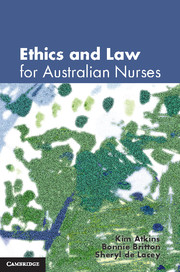Book contents
- Frontmatter
- Contents
- Introduction
- 1 Understanding the human person
- 2 Understanding legal rights and obligations
- 3 Nursing and the legal system
- 4 The nurse–patient relationship
- 5 Consent
- 6 Duty of care and professional negligence
- 7 Patient information, confidentiality and trust
- 8 ‘Trust me, I’m a nurse’
- 9 Witnessing and making mistakes
- Appendix: Tables of legislation
- References
- Index
6 - Duty of care and professional negligence
- Frontmatter
- Contents
- Introduction
- 1 Understanding the human person
- 2 Understanding legal rights and obligations
- 3 Nursing and the legal system
- 4 The nurse–patient relationship
- 5 Consent
- 6 Duty of care and professional negligence
- 7 Patient information, confidentiality and trust
- 8 ‘Trust me, I’m a nurse’
- 9 Witnessing and making mistakes
- Appendix: Tables of legislation
- References
- Index
Summary
LEARNING OBJECTIVES
In this chapter, you will:
Develop an understanding of the concepts of ‘duty of care’ and ‘standard of care’
Learn how a nurse's ‘scope of practice’ is determined
Learn how a nurse's actions or omissions may be determined to be negligent
Learn how to avoid acting negligently
Gain an understanding of vicarious liability and professional indemnity
Two ambulance officers attended a collapsed, unconscious person. Following ambulance protocol, a dose of intravenous adrenaline was administered. The person remained unresponsive. A second dose of adrenaline was administered, as per the ambulance protocol. Consequently, the person suffered a cerebral bleed as a result of high blood pressure induced by the adrenaline.
The ambulance officer was initially found to be negligent, but the finding was overturned on appeal. The appeal judge determined that, by following ambulance protocol, the ambulance officer did provide a reasonable standard of care, and that the harm suffered by the person was not the result of a breach of duty of care. (Eburn 2007)
DUTY OF CARE
Chapter 4 noted that nurses have a duty of care towards their patients. Duty of care refers to the legal obligation on a professional to exercise reasonable care and skill in the provision of professional treatment:
a person comes under a duty of care in relation to the provision of advice or information if he carries on a business or profession and in the course of it provides advice or information of a kind which calls for skill and competence or otherwise professes to possess skill and competence and he provides advice or information when he knows or ought to know that the recipient intends to act or rely on it. (Mason J in Shaddock & Associates v Parramatta City Council (1981) 150 CLR 225 at 248–9)
- Type
- Chapter
- Information
- Ethics and Law for Australian Nurses , pp. 121 - 145Publisher: Cambridge University PressPrint publication year: 2011

